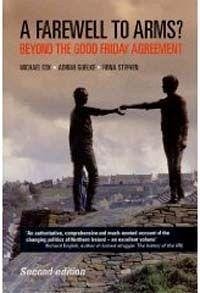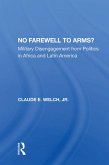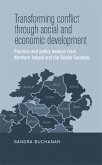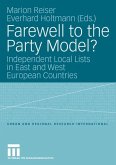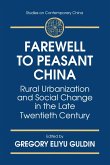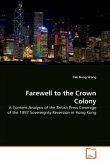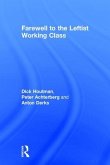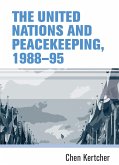- Gebundenes Buch
- Merkliste
- Auf die Merkliste
- Bewerten Bewerten
- Teilen
- Produkt teilen
- Produkterinnerung
- Produkterinnerung
The signing of the Good Friday Agreement in 1998 appeared to open up a new phase in the history of Northern Ireland and indeed world politics generally. Hailed from the outset as a model that would inspire peace processes in other countries, it sought through careful negotiation and delicate compromise to bring to a conclusion a conflict that had cost over 3600 lives, damaged Britain's international position and at times come very close to undermining relations between the UK and Ireland. While the peace has held it is obvious that serious divisions continue to make a final settlement of the…mehr
Andere Kunden interessierten sich auch für
![No Farewell To Arms? No Farewell To Arms?]() Claude WelchNo Farewell To Arms?204,99 €
Claude WelchNo Farewell To Arms?204,99 €![Transforming Conflict Through Social and Economic Development Transforming Conflict Through Social and Economic Development]() Sandra BuchananTransforming Conflict Through Social and Economic Development156,99 €
Sandra BuchananTransforming Conflict Through Social and Economic Development156,99 €![Farewell to the Party Model? Farewell to the Party Model?]() Marion Reiser / Everhard Holtmann (eds.)Farewell to the Party Model?53,49 €
Marion Reiser / Everhard Holtmann (eds.)Farewell to the Party Model?53,49 €![Farewell to Peasant China Farewell to Peasant China]() Gregory Eliyu GuldinFarewell to Peasant China48,99 €
Gregory Eliyu GuldinFarewell to Peasant China48,99 €![Farewell to the Crown Colony Farewell to the Crown Colony]() Pak Nung WongFarewell to the Crown Colony32,99 €
Pak Nung WongFarewell to the Crown Colony32,99 €![Farewell to the Leftist Working Class Farewell to the Leftist Working Class]() Peter AchterbergFarewell to the Leftist Working Class203,99 €
Peter AchterbergFarewell to the Leftist Working Class203,99 €![The United Nations and Peacekeeping, 1988-95 The United Nations and Peacekeeping, 1988-95]() Chen KertcherThe United Nations and Peacekeeping, 1988-95156,99 €
Chen KertcherThe United Nations and Peacekeeping, 1988-95156,99 €-
-
-
The signing of the Good Friday Agreement in 1998 appeared to open up a new phase in the history of Northern Ireland and indeed world politics generally. Hailed from the outset as a model that would inspire peace processes in other countries, it sought through careful negotiation and delicate compromise to bring to a conclusion a conflict that had cost over 3600 lives, damaged Britain's international position and at times come very close to undermining relations between the UK and Ireland. While the peace has held it is obvious that serious divisions continue to make a final settlement of the Northern Irish question very difficult. This comprehensive and original study is the first to explain in detail how the Good Friday Agreement ran into trouble, why we are still some way from a final settlement, but why a return to war is most unlikely - even in an age where global terror now threatens world order more seriously than at any time in the past. This new edition of an established, authoritative text will be essential reading for students, researchers and academics of Irish politics, conflict and peace studies, and international relations.
Hinweis: Dieser Artikel kann nur an eine deutsche Lieferadresse ausgeliefert werden.
Hinweis: Dieser Artikel kann nur an eine deutsche Lieferadresse ausgeliefert werden.
Produktdetails
- Produktdetails
- Verlag: Manchester University Press
- 2nd edition
- Seitenzahl: 576
- Erscheinungstermin: 12. Januar 2006
- Englisch
- Abmessung: 234mm x 156mm x 3mm
- Gewicht: 3g
- ISBN-13: 9780719071140
- ISBN-10: 0719071143
- Artikelnr.: 21410593
- Herstellerkennzeichnung
- Libri GmbH
- Europaallee 1
- 36244 Bad Hersfeld
- gpsr@libri.de
- Verlag: Manchester University Press
- 2nd edition
- Seitenzahl: 576
- Erscheinungstermin: 12. Januar 2006
- Englisch
- Abmessung: 234mm x 156mm x 3mm
- Gewicht: 3g
- ISBN-13: 9780719071140
- ISBN-10: 0719071143
- Artikelnr.: 21410593
- Herstellerkennzeichnung
- Libri GmbH
- Europaallee 1
- 36244 Bad Hersfeld
- gpsr@libri.de
Michael Cox is Professor of International Relations at the LSE. Adrian Guelke is Professor of Comparative Politics and Director of the Centre for the Study of Ethnic Conflict at The Queen's University of Belfast. Fiona Stephen has recently completed a study on the politics of integrated education in Northern Ireland based on her doctoral research undertaken at The Queen's University of Belfast
Introduction: A farewell to arms? Beyond the Good Friday Agreement -
Michael Cox, Adrian Guelke, and Fiona Stephen PART ONE. From 'Long War' to
long peace 1. Lost lives: Victims and the construction of victimhood' in
Northern Ireland - Marie Smyth 2. The background to the Irish peace process
- Martin Mansergh 3. From war to uneasy peace in Northern Ireland -
Caroline Kennedy-Pipe 4. Myths of consociationalism: From Good Friday to
political impasse - Paul Bew PART TWO. The politics of the Good Friday
Agreement 5. Polarisation or new moderation? Party politics since the Good
Friday Agreement - Jon Tonge 6. The 1998 Agreement: Three unionist
anxieties - Arthur Aughey 7. The SDLP- governing with uncertainty - Sean
Farren 8. Irish republicanism and the peace process: From revolution to
reform - Roger MacGinty 9. Noises off: Loyalists after the Agreement -
Gordon Gillespie PART THREE. Agreement at the crossroads 10. A farewell to
arms? Decommissioning and the peace process - Colin McInnes 11. New
beginnings? Policing and human rights after the conflict - Brice Dickson
12. The totality of relationships? The British / Irish Council - Stephen
Hopkins 13.`A 'most difficult and unpalatable part' - the release of
politically motivated violent offenders - Michael von Tangen Page 14. A
truce rather a treaty? The effect of violence on the Irish peace process -
John Darby PART FOUR. Civil Society 15. Segregation, ethno-sectarianism and
the 'new' Belfast - Peter Shirlow 16. Constitutionalism, civil society and
democratic renewal in Northern Ireland - John Morison 17. Two cheers for
the NGOs: Building peace from below in Northern Ireland - Feargal Cochrane
18. Integrated schools: Myths, hopes and prospect - Fiona Stephen 19
Whatever happened to the women? Gender and peace in Northern Ireland - Kate
Fearon 20 From 'long war' to 'war of the lillies': 'Post-conflict'
territorial compromise and the return of cultural politics - Cathal McCall
PART FIVE. Bringing in the international 21 From Anglo-Irish to
British-Irish relations - Paul Gillespie 22 Europe and the europeanisation
of the Irish Question - Elizabeth Meehan 23 The new American connection:
President George W. Bush and Northern Ireland - John Dumbrell 24 Political
comparisons: From Johannesburg to Jerusalem - Adrian Guelke 25 Learning
from other places: Northern Ireland, the Basque Country and Corsica -
Francesco Letamendia and John Loughlin 26 Peace processes in the late
twentieth century and beyond a mixed record - Fred Halliday 27. Rethinking
the international: A critique - Paul Dixon 28. Rethinking the
international: A defence - Michael Cox Conclusion: Peace after the Good
Friday Agreement? - Adrian Guelke, Michael Cox, and Fiona Stephen
Appendices 1. Chronology of Northern Ireland from war to peace 2. The Good
Friday Agreement (Belfast Agreement) 10 April 1998 3. 'Towards A Lasting
Peace', Sinn Fein document, 1992 (extract) 4. Joint Declaration on Peace
(Downing Street Declaration), 15 December 1993 5. A personal message from
Rt. Hon. Sir Patrick Mayhew, December 1993 6. The TUAS (Tactical Use of
Armed Struggle) document circulated by Republican leadership, summer 1994
7. IRA ceasefire statement, 31, August 1994 8. Combined Loyalist Military
Command (CLMC) ceasefire statement, 13 October 1994 9. A new framework for
agreement 1995 10. The Mitchell principles, January 1996 (extract) 11. IRA
ceasefire statement, 19 July 1997 12. 'Propositions on Heads of Agreement'
issued by British and Irish governments, 12 January 1998 13. The
Hillsborough statement, 1 April 1999 14. 'The Way Forward' joint statement
by British and Irish governments at Stormont, 2 July 1999 15. Statement
issued by the IRA, 21 July 1999 16. Statement by Senator George Mitchell
concluding the review of the Northern Ireland peace process, 18 November
1999 17. 'IRA Statement on Arms Inspection' 26 June 2000. 18. Joint
statement by British and Irish governments, 25 June 2004 19. Gerry Adams
review of the Good Friday Agreement, 3 February 2004. 20. Speech by David
Trimble, 27 March 2004 21. Devolution now: Democratic unionist Party
(extracts) 5 February 2004
Michael Cox, Adrian Guelke, and Fiona Stephen PART ONE. From 'Long War' to
long peace 1. Lost lives: Victims and the construction of victimhood' in
Northern Ireland - Marie Smyth 2. The background to the Irish peace process
- Martin Mansergh 3. From war to uneasy peace in Northern Ireland -
Caroline Kennedy-Pipe 4. Myths of consociationalism: From Good Friday to
political impasse - Paul Bew PART TWO. The politics of the Good Friday
Agreement 5. Polarisation or new moderation? Party politics since the Good
Friday Agreement - Jon Tonge 6. The 1998 Agreement: Three unionist
anxieties - Arthur Aughey 7. The SDLP- governing with uncertainty - Sean
Farren 8. Irish republicanism and the peace process: From revolution to
reform - Roger MacGinty 9. Noises off: Loyalists after the Agreement -
Gordon Gillespie PART THREE. Agreement at the crossroads 10. A farewell to
arms? Decommissioning and the peace process - Colin McInnes 11. New
beginnings? Policing and human rights after the conflict - Brice Dickson
12. The totality of relationships? The British / Irish Council - Stephen
Hopkins 13.`A 'most difficult and unpalatable part' - the release of
politically motivated violent offenders - Michael von Tangen Page 14. A
truce rather a treaty? The effect of violence on the Irish peace process -
John Darby PART FOUR. Civil Society 15. Segregation, ethno-sectarianism and
the 'new' Belfast - Peter Shirlow 16. Constitutionalism, civil society and
democratic renewal in Northern Ireland - John Morison 17. Two cheers for
the NGOs: Building peace from below in Northern Ireland - Feargal Cochrane
18. Integrated schools: Myths, hopes and prospect - Fiona Stephen 19
Whatever happened to the women? Gender and peace in Northern Ireland - Kate
Fearon 20 From 'long war' to 'war of the lillies': 'Post-conflict'
territorial compromise and the return of cultural politics - Cathal McCall
PART FIVE. Bringing in the international 21 From Anglo-Irish to
British-Irish relations - Paul Gillespie 22 Europe and the europeanisation
of the Irish Question - Elizabeth Meehan 23 The new American connection:
President George W. Bush and Northern Ireland - John Dumbrell 24 Political
comparisons: From Johannesburg to Jerusalem - Adrian Guelke 25 Learning
from other places: Northern Ireland, the Basque Country and Corsica -
Francesco Letamendia and John Loughlin 26 Peace processes in the late
twentieth century and beyond a mixed record - Fred Halliday 27. Rethinking
the international: A critique - Paul Dixon 28. Rethinking the
international: A defence - Michael Cox Conclusion: Peace after the Good
Friday Agreement? - Adrian Guelke, Michael Cox, and Fiona Stephen
Appendices 1. Chronology of Northern Ireland from war to peace 2. The Good
Friday Agreement (Belfast Agreement) 10 April 1998 3. 'Towards A Lasting
Peace', Sinn Fein document, 1992 (extract) 4. Joint Declaration on Peace
(Downing Street Declaration), 15 December 1993 5. A personal message from
Rt. Hon. Sir Patrick Mayhew, December 1993 6. The TUAS (Tactical Use of
Armed Struggle) document circulated by Republican leadership, summer 1994
7. IRA ceasefire statement, 31, August 1994 8. Combined Loyalist Military
Command (CLMC) ceasefire statement, 13 October 1994 9. A new framework for
agreement 1995 10. The Mitchell principles, January 1996 (extract) 11. IRA
ceasefire statement, 19 July 1997 12. 'Propositions on Heads of Agreement'
issued by British and Irish governments, 12 January 1998 13. The
Hillsborough statement, 1 April 1999 14. 'The Way Forward' joint statement
by British and Irish governments at Stormont, 2 July 1999 15. Statement
issued by the IRA, 21 July 1999 16. Statement by Senator George Mitchell
concluding the review of the Northern Ireland peace process, 18 November
1999 17. 'IRA Statement on Arms Inspection' 26 June 2000. 18. Joint
statement by British and Irish governments, 25 June 2004 19. Gerry Adams
review of the Good Friday Agreement, 3 February 2004. 20. Speech by David
Trimble, 27 March 2004 21. Devolution now: Democratic unionist Party
(extracts) 5 February 2004
Introduction: A farewell to arms? Beyond the Good Friday Agreement -
Michael Cox, Adrian Guelke, and Fiona Stephen PART ONE. From 'Long War' to
long peace 1. Lost lives: Victims and the construction of victimhood' in
Northern Ireland - Marie Smyth 2. The background to the Irish peace process
- Martin Mansergh 3. From war to uneasy peace in Northern Ireland -
Caroline Kennedy-Pipe 4. Myths of consociationalism: From Good Friday to
political impasse - Paul Bew PART TWO. The politics of the Good Friday
Agreement 5. Polarisation or new moderation? Party politics since the Good
Friday Agreement - Jon Tonge 6. The 1998 Agreement: Three unionist
anxieties - Arthur Aughey 7. The SDLP- governing with uncertainty - Sean
Farren 8. Irish republicanism and the peace process: From revolution to
reform - Roger MacGinty 9. Noises off: Loyalists after the Agreement -
Gordon Gillespie PART THREE. Agreement at the crossroads 10. A farewell to
arms? Decommissioning and the peace process - Colin McInnes 11. New
beginnings? Policing and human rights after the conflict - Brice Dickson
12. The totality of relationships? The British / Irish Council - Stephen
Hopkins 13.`A 'most difficult and unpalatable part' - the release of
politically motivated violent offenders - Michael von Tangen Page 14. A
truce rather a treaty? The effect of violence on the Irish peace process -
John Darby PART FOUR. Civil Society 15. Segregation, ethno-sectarianism and
the 'new' Belfast - Peter Shirlow 16. Constitutionalism, civil society and
democratic renewal in Northern Ireland - John Morison 17. Two cheers for
the NGOs: Building peace from below in Northern Ireland - Feargal Cochrane
18. Integrated schools: Myths, hopes and prospect - Fiona Stephen 19
Whatever happened to the women? Gender and peace in Northern Ireland - Kate
Fearon 20 From 'long war' to 'war of the lillies': 'Post-conflict'
territorial compromise and the return of cultural politics - Cathal McCall
PART FIVE. Bringing in the international 21 From Anglo-Irish to
British-Irish relations - Paul Gillespie 22 Europe and the europeanisation
of the Irish Question - Elizabeth Meehan 23 The new American connection:
President George W. Bush and Northern Ireland - John Dumbrell 24 Political
comparisons: From Johannesburg to Jerusalem - Adrian Guelke 25 Learning
from other places: Northern Ireland, the Basque Country and Corsica -
Francesco Letamendia and John Loughlin 26 Peace processes in the late
twentieth century and beyond a mixed record - Fred Halliday 27. Rethinking
the international: A critique - Paul Dixon 28. Rethinking the
international: A defence - Michael Cox Conclusion: Peace after the Good
Friday Agreement? - Adrian Guelke, Michael Cox, and Fiona Stephen
Appendices 1. Chronology of Northern Ireland from war to peace 2. The Good
Friday Agreement (Belfast Agreement) 10 April 1998 3. 'Towards A Lasting
Peace', Sinn Fein document, 1992 (extract) 4. Joint Declaration on Peace
(Downing Street Declaration), 15 December 1993 5. A personal message from
Rt. Hon. Sir Patrick Mayhew, December 1993 6. The TUAS (Tactical Use of
Armed Struggle) document circulated by Republican leadership, summer 1994
7. IRA ceasefire statement, 31, August 1994 8. Combined Loyalist Military
Command (CLMC) ceasefire statement, 13 October 1994 9. A new framework for
agreement 1995 10. The Mitchell principles, January 1996 (extract) 11. IRA
ceasefire statement, 19 July 1997 12. 'Propositions on Heads of Agreement'
issued by British and Irish governments, 12 January 1998 13. The
Hillsborough statement, 1 April 1999 14. 'The Way Forward' joint statement
by British and Irish governments at Stormont, 2 July 1999 15. Statement
issued by the IRA, 21 July 1999 16. Statement by Senator George Mitchell
concluding the review of the Northern Ireland peace process, 18 November
1999 17. 'IRA Statement on Arms Inspection' 26 June 2000. 18. Joint
statement by British and Irish governments, 25 June 2004 19. Gerry Adams
review of the Good Friday Agreement, 3 February 2004. 20. Speech by David
Trimble, 27 March 2004 21. Devolution now: Democratic unionist Party
(extracts) 5 February 2004
Michael Cox, Adrian Guelke, and Fiona Stephen PART ONE. From 'Long War' to
long peace 1. Lost lives: Victims and the construction of victimhood' in
Northern Ireland - Marie Smyth 2. The background to the Irish peace process
- Martin Mansergh 3. From war to uneasy peace in Northern Ireland -
Caroline Kennedy-Pipe 4. Myths of consociationalism: From Good Friday to
political impasse - Paul Bew PART TWO. The politics of the Good Friday
Agreement 5. Polarisation or new moderation? Party politics since the Good
Friday Agreement - Jon Tonge 6. The 1998 Agreement: Three unionist
anxieties - Arthur Aughey 7. The SDLP- governing with uncertainty - Sean
Farren 8. Irish republicanism and the peace process: From revolution to
reform - Roger MacGinty 9. Noises off: Loyalists after the Agreement -
Gordon Gillespie PART THREE. Agreement at the crossroads 10. A farewell to
arms? Decommissioning and the peace process - Colin McInnes 11. New
beginnings? Policing and human rights after the conflict - Brice Dickson
12. The totality of relationships? The British / Irish Council - Stephen
Hopkins 13.`A 'most difficult and unpalatable part' - the release of
politically motivated violent offenders - Michael von Tangen Page 14. A
truce rather a treaty? The effect of violence on the Irish peace process -
John Darby PART FOUR. Civil Society 15. Segregation, ethno-sectarianism and
the 'new' Belfast - Peter Shirlow 16. Constitutionalism, civil society and
democratic renewal in Northern Ireland - John Morison 17. Two cheers for
the NGOs: Building peace from below in Northern Ireland - Feargal Cochrane
18. Integrated schools: Myths, hopes and prospect - Fiona Stephen 19
Whatever happened to the women? Gender and peace in Northern Ireland - Kate
Fearon 20 From 'long war' to 'war of the lillies': 'Post-conflict'
territorial compromise and the return of cultural politics - Cathal McCall
PART FIVE. Bringing in the international 21 From Anglo-Irish to
British-Irish relations - Paul Gillespie 22 Europe and the europeanisation
of the Irish Question - Elizabeth Meehan 23 The new American connection:
President George W. Bush and Northern Ireland - John Dumbrell 24 Political
comparisons: From Johannesburg to Jerusalem - Adrian Guelke 25 Learning
from other places: Northern Ireland, the Basque Country and Corsica -
Francesco Letamendia and John Loughlin 26 Peace processes in the late
twentieth century and beyond a mixed record - Fred Halliday 27. Rethinking
the international: A critique - Paul Dixon 28. Rethinking the
international: A defence - Michael Cox Conclusion: Peace after the Good
Friday Agreement? - Adrian Guelke, Michael Cox, and Fiona Stephen
Appendices 1. Chronology of Northern Ireland from war to peace 2. The Good
Friday Agreement (Belfast Agreement) 10 April 1998 3. 'Towards A Lasting
Peace', Sinn Fein document, 1992 (extract) 4. Joint Declaration on Peace
(Downing Street Declaration), 15 December 1993 5. A personal message from
Rt. Hon. Sir Patrick Mayhew, December 1993 6. The TUAS (Tactical Use of
Armed Struggle) document circulated by Republican leadership, summer 1994
7. IRA ceasefire statement, 31, August 1994 8. Combined Loyalist Military
Command (CLMC) ceasefire statement, 13 October 1994 9. A new framework for
agreement 1995 10. The Mitchell principles, January 1996 (extract) 11. IRA
ceasefire statement, 19 July 1997 12. 'Propositions on Heads of Agreement'
issued by British and Irish governments, 12 January 1998 13. The
Hillsborough statement, 1 April 1999 14. 'The Way Forward' joint statement
by British and Irish governments at Stormont, 2 July 1999 15. Statement
issued by the IRA, 21 July 1999 16. Statement by Senator George Mitchell
concluding the review of the Northern Ireland peace process, 18 November
1999 17. 'IRA Statement on Arms Inspection' 26 June 2000. 18. Joint
statement by British and Irish governments, 25 June 2004 19. Gerry Adams
review of the Good Friday Agreement, 3 February 2004. 20. Speech by David
Trimble, 27 March 2004 21. Devolution now: Democratic unionist Party
(extracts) 5 February 2004

